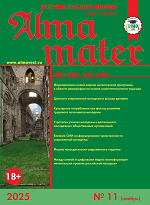UDC 159.9+37.04
https://doi.org/10.20339/AM.10-20.035
O.Yu. Angelova is Cand.Sci. (Economy), Ass. prof. e-mail: oangelova@mail.ru; T.O. Podolskaya is Cand.Sci. (Sociology), Ass. prof. e-mail: podolskaya79@yandex.ru; and M.V. Prokhorova is Cand.Sci. (Psychology), Ass. prof. e-mail: personalgerente@mail.ru at Lobachevsky State University of Nizhny Novgorod
Presented is empirical investigation, conducted on the base of university centre, specialized in teenagers’ training on scientific and physic-mathematical field. Parents of 85 gifted children took part in the research. Interview was utilized to collect data that was analyzed by means of descriptive statistics and cross-tabulation. Age periods, that could be considered “sensitive” to reveal children’s general giftedness, their achievement of primary results and forming an image of future profession, were singled out. Most often unveiling giftedness occurs in pre-school childhood, reaching primary results, in junior school childhood and forming an image of future profession in junior teens. It was stated, that an interval existed between time of revealing capabilities of gifted children and launch of their active support by parents as well as involvement of focused specialists. It could be shortened at the expense of psychological and pedagogical training and corresponding informational guidance.
Key words: giftedness, sensitive age, image of future profession, age facets of giftedness, cognitive motivation, gifted children.
References
1. Revesh, G. Early manifestation of giftedness and it’s recognition. Moscow, 1924.
2. Worrell, F.C., et al. Gifted students. Annual review of psychology. 2019. Vol. 70. P. 551–576.
3. Stoeger, H., Balestrini, D.P., Ziegler, A. International perspectives and trends in research on giftedness and talent development. Handbook of Giftedness and Talent. 2018. P. 25–38.
4. Porter, L. Gifted young children: A guide for teachers and parents. Buckingham, 1999.
5. Rubishtein, S.L. General psychology. In 2 vols. Vol. 1. Moscow, 1989.
6. Ivleva, M.L., Bagramyanc, N.L. General characteristic and status of applied research of talent. Izvestiya MAMI. 2012. No. 2 (14). P. 288–294.
7. Bloom, B.S., Sosniak, L. Talent development vs. schooling. Educational Leadership. 1981. No. 39 (2). P. 86–94.
8. Takacs, C. They don’t get gifted until 4th grade: what parents can do until then. Roeper Review. 1982. No. 4. P. 43–45.
9. Matyushkin, A.N. A gifted child through the eyes of educators and parents. Revealing and encouraging creative children. Moscow, 2008. P. 113–123.
10. Romanova, E.S. Psychological analysis of professional career success problems in gifted students. Systems Psychology and Sociology. 2015. No. 4 (16). P. 5–12.
11. Elkonin, D.V. Selected psychological works. Moscow, 1989.
12. Teplov, B.M. Selected psychological works. In 2 vols. Vol. 1. Moscow, 1985.
13. Gellershteyn, S.G. Psychotechnics. Moscow, 1926.
14. Bogoyavlenskaya, D.B. Once again the notion of giftedness: methodological approaches. Personality Formation. 2014. No. 4. P. 58–66.
15. RAEX publishes ratings of schools in terms of the competitiveness of graduates in the enlarged areas of training. URL: https://raex-a.ru/releases/2020/22April
16. Markova, A.K. Psychology of professionalism. Moscow, 1996.
17. Klimov, E.A. Introduction to work psychology. Moscow, 2004.
18. Zeer, E.F. Theoretical and applied foundations of the psychology of professional development. Ekaterinburg, 2015.
19. Yurkevich, V.S. Gifted Children: Today’s Trends and Tomorrow’s Challenges. Psychological Science and Education. 2011. No. 4. P. 99–108.











.png)






